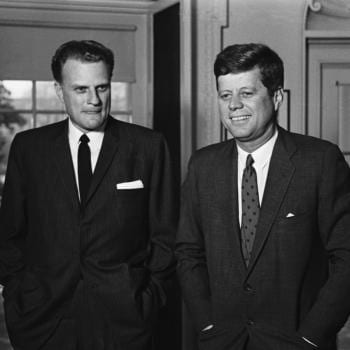Learned discussions of whether to grant citizenship to children born on U.S. soil to parents who are not citizens are available elsewhere and some are very good. For all of the e-ink that Christians have spilled on the issue I am surprised that no one has actually likened the situation to questions about infant baptism or even the Puritans and the Halfway Covenant. In that latter matter, New England Protestants, who baptized babies, had to decide whether to baptize the children of persons who had been baptized as children but had never experienced the conversion that was necessary for full membership. The Puritans decided to baptize those children of non-communicant church members and so include those babies in the social and religious entities of Massachusetts Bay — except, they would not enjoy the full privileges of church membership such as partaking of the Lord’s Supper.
Since many American Protestants imagine their nation as the creation of the Puritans, I wonder why no one has appealed to the Puritans to justify birthright citizenship. Make America Puritan Again.
Perhaps the reason is that most American Protestants are Baptist instinctively. That means that children of Christian parents do not receive the sacrament of baptism until they make a confession of faith — that is the credo-baptist position. The Puritans and other Protestants in the Reformed tradition maintain something closer to birthright church membership — or paedo-baptist. That is, these Protestants recognize Christian children as members of the church by virtue of the covenant of grace, and so those children are given the privileges of belonging to the church except that they do not enter into full communion until they go through confirmation or make a credible profession of faith. Baptized babies are non-communicant members of the church. Once they show signs of owning their baptism, they become communicant members, as in those who commune with Christ and others in the Lord’s Supper.
Here is how the Westminster Confession puts it:
The visible church, which is also catholic or universal under the gospel (not confined to one nation, as before under the law), consists of all those throughout the world that profess the true religion; and of their children: and is the kingdom of the Lord Jesus Christ, the house and family of God, out of which there is no ordinary possibility of salvation. (25.2)
Not only those that do actually profess faith in and obedience unto Christ, but also the infants of one, or both, believing parents, are to be baptized. (28.3)
Those in favor of birthright citizenship seem to be applying the Presbyterian position to the United States political order. Those born on American soil become citizens as children. Of course, they cannot vote and do not have to pay taxes. They do not participate in all the aspects of American citizenship until they reach a certain age. But they still belong to the United States just like baptized babies in a Presbyterian congregation belong to the church.
The wrinkle, though, for those Christians who advocate birthright citizenship on Christian grounds is that no Presbyterian or Puritan would think to baptize a baby simply because he or she were born within the church building or in Massachusetts Bay Colony. They would require the parents to have some connection to the church, just as some who question birthright citizenship might question whether anyone from any place in the world can simply cross the U.S. border, deliver a child, and find citizenship for the baby. It would be like baptizing the infants of people who are Jewish or Muslim or non-religious simply by some kind of physical attachment to land or architecture.
But one thing can certainly be said for birthright citizenship — borders matter.












